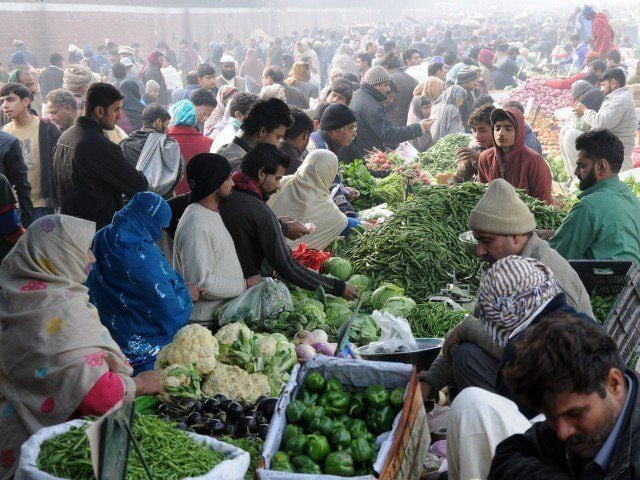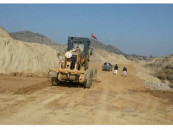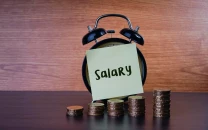Inflation rate bounces back ahead of IMF talks
Clocks in at 24.5% in December due to a spike in prices of food products

Ahead of a possible increase in electricity and gas rates as well as taxes for the revival of the International Monetary Fund programme, the inflation rate bounced back to 24.5% in December due to a massive spike in prices of food products.
The perishable food items’ prices surged in a season, which usually had seen lower prices due to better supplies, indicating the breakdown of regular supplies and the administrative failure of all the five governments.
Read Year in review: Will the economy survive 2023?
The Consumer Price Index (CPI), the inflation monitor, rose by 24.5% in December compared to the same period of last year, the Pakistan Bureau of Statistics (PBS) reported on Monday.
The prices of a majority of consumer goods remained out of the reach of people, and the major surge was in rural areas where income levels were already low. The surge might force the consumers to change their expenditure patterns to spare more money to buy essential foods.
The higher inflation rate was recorded in rural areas where it spiralled to 28.8% while it remained unchanged at 21.6% in the urban areas, according to the PBS.
The inflation rate beat the expectation of the Ministry of Finance, which had ranged its inflation forecast 21% to 23%.
Food inflation skyrocketed to nearly 38% in rural areas and it also significantly jumped to 32.7% in cities last month, the PBS data showed.
The food group prices surged by 35.5% in December compared to the same month a year ago. But the prices of perishable food items soared by 56%, which still showed a significant demand and supply gap.
The prices of onions increased by 415% in cities and 464% in villages compared to a year ago followed by a 64% increase in rates of tea.
The wheat – an essential staple food of an overwhelming majority of Pakistanis – is now getting out of reach for them. Its prices increased over 57% while the wheat flour prices also increased by 41%, according to the PBS.
Read More Economy tanks amid deafening political din
As a result, restaurants and retail outlets have increased the prices of chappati.
The vegetable ghee and cooking oil prices surged over one-third last month compared to a year ago, according to the PBS.
The prices of alcoholic beverages and tobacco group soared by 35% while those of the clothing and footwear group surged by 13%.
The inflation rate bounced back at a time when the government was now coming under increased pressure to end its indecisiveness and move swiftly to revive the IMF programme aimed at avoiding the sovereign default. But it will require implementation of painful steps like increasing the energy prices, imposing more taxes and ending artificial control over the exchange rate.
Minister of State for Finance Dr Aisha Pasha said that Pakistan and the IMF might meet on the sidelines of Geneva Donor’s Conference on January 9. The talks have been halted due to serious disagreement over a number of issues.
The non-food inflation rate slowed down in cities and rural areas but would significantly jump after the government increases the energy prices, creating a perfect storm.
Core inflation, which was calculated after excluding the volatile energy and food prices, increased in December to 14.7% in urban areas and 19% in rural areas. The core inflation was still higher than the State Bank’s upward revised policy rate of 16%, indicating the underline inflationary pressures.
The sources said that in the last meeting, the SBP management was under pressure to cut the policy rate but it was the monetary policy committee that decided to increase the rate despite all pressures.
The prices of the housing, water, electricity and gas fuels groups were higher by nearly 7% and could spike further in the coming months.
The transport group saw a price hike of 41% on the back of increase in fuel prices, according to the PBS.
Also Read COAS urges national consensus to sail through economic, security challenges
Petrol was expensive by half compared to a year ago, followed by increase in prices of stationary, washing soap, transport services and accessories of vehicles.
For the July-December period of the current fiscal year, the data showed that average inflation came in at 25%, which was more than double the official target of 11.5% for the current fiscal year, set before the floods. The average inflation rate in villages was nearly 28%.
The central bank, whose core responsibility was now to contain the inflation, last month produced a mere report on the reasons behind the surge in inflation, taking no responsibility for a rate which was higher than the official target.
It has for the current fiscal year thrice revised the annual forecast range, now setting it at 21-23%.
The amended SBP law makes it responsible for containing inflation and ensuring price stability. But the law did not suggest any penalties for missing the inflation target.



















COMMENTS
Comments are moderated and generally will be posted if they are on-topic and not abusive.
For more information, please see our Comments FAQ